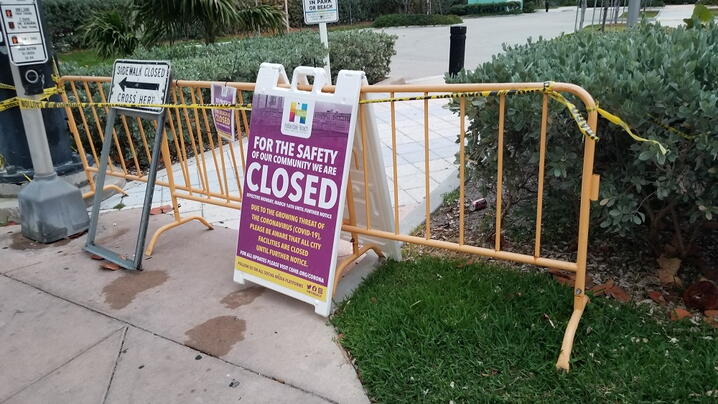
As I write this, my team and I are nervously looking up the side of a mountain of the projected peak of cases in Florida. Hallandale Beach is a mid-sized city located between Miami and Fort Lauderdale, on the Broward County line with Miami-Dade, the state’s two counties most heavily hit with COVID19 cases. The actions we take as a city after the peak, projected to hit in just a few days, are just as critical as the decisions we are making now before new infections and deaths level off.
More than a year ago, our city made a commitment to developing a Post-Disaster Redevelopment Plan (PDRP) because of our risk due to the annual Atlantic hurricane season and sea-level rise. Last year’s hurricane that devastated Freeport, Bahamas, could have very well wiped us off the map. At the time the commission approved moving forward on this plan, no one anticipated we would need to be planning for the aftermath of an economically devastating global pandemic.
The plan is quite simple: It will serve as a framework to help the city and its partners organize and prepare for the long road ahead. Alyssa Jones Wood, our city’s Green Initiatives coordinator, has already had virtual stakeholder meetings by video call. Stakeholders specializing in housing, economic development, infrastructure, community planning, health and social services, and natural and cultural resources are now filling out a survey in lieu of the usual in-person interviews, which simply aren't possible with COVID-19. We will be presenting the full PDRP in early June for commission adoption and potentially activation in the very same meeting. By organizing now, while our nation is still responding to immediate needs, our city, with support from the South Florida Regional Planning Council, can build a strong foundation for long-term recovery that will surely be needed following this event.
We’re doing this with a special grant from the State of Florida Department of Economic Opportunity. This grant requires us to complete this framework by mid-May in preparation for adoption by the city in June. It is not likely that our city or nation will have a full understanding of the long-term impacts, needs, or resources available to address the long-term recovery from COVID19 prior to the completion of this plan, but we’re going to give it our best shot. While we’re at it, we will be building in resilience measures to make us--as an organization and community--better able to withstand shocks like this in the future. We know our residents, as well as our local economy, are going to need heavy lifting in terms of help getting back on their feet.
By taking steps now to confirm goals for long-term redevelopment of the city of Hallandale Beach through pre-existing visions, the community can quickly put this plan into action in the months following its completion. Activation will likely include subcommittees, partnerships, and seeking resources to kick start the long-term recovery of the city. While the development of this plan is on a tight timeline, rest assured Hallandale Beach is using this opportunity to ramp up for long-term recovery following our current crisis, while maintaining a strong focus on the immediate needs of the citizens in our community.
More than a year ago, our original intent for this plan was to better prepare for long-term recovery from hurricanes and other natural hazards. However, recovery is recovery, regardless of if the disaster was a hurricane or a pandemic like we’re experiencing now. The beauty of this plan is that we’re focusing on so many areas of recovery, including health and human services. Because of COVID-19 however, the project team is taking a deeper dive into different social vulnerabilities in our area and how we can rebuild as a resilient and more equitable community. Similar to the aftermath of a hurricane, the community will need to remind people that Hallandale Beach is beautiful, clean, open for business, and a great place to live or visit. Tourism is a huge part of our economy and this is well accounted for in the “economic development” part of the plan. The only difference between long-term recovery from a hurricane and a pandemic as it relates to tourism is that we will be working with local businesses to make sure our hotels, restaurants, etc., have the communication tools they need to vocalize how they’re staying clean by following best safety practices.
We're following the guide, Post-Disaster Redevelopment Planning: Addressing Adaptation During Long-Term Recovery, to produce the city’s post-disaster redevelopment plan, which includes:
- Guidance on how to assess existing plans, policies, and programs that may exist within your community and support community adaptation.
- A range of policy recommendations for addressing the post-disaster redevelopment planning process.
- Opportunities to support the post-disaster implementation strategies.
For additional information, visit ICMA’s Coronavirus Resource page.
New, Reduced Membership Dues
A new, reduced dues rate is available for CAOs/ACAOs, along with additional discounts for those in smaller communities, has been implemented. Learn more and be sure to join or renew today!
